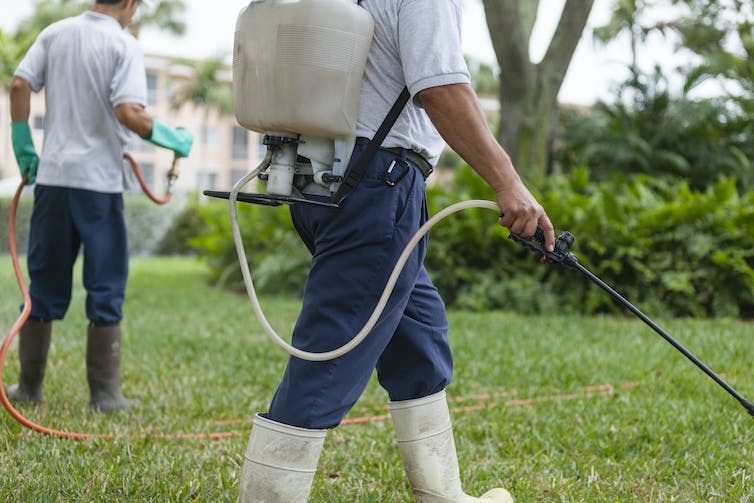
Your child could go to gym class on Monday morning and play soccer on a field that was sprayed over the weekend with 2,4-D, a toxic weedkiller that has been investigated as possibly causing cancer. Alternatively, the school grounds may have been treated with a lower-toxicity weedkiller. Or maybe the grounds were managed with safe, nontoxic products and techniques.
Which of these scenarios applies depends in large part on your state’s laws and regulations today – more so than federal regulations.
For example, Texas requires all school districts to adopt an integrated pest management program for school buildings; IPM prioritizes nonchemical pest control methods and includes some protections regarding spraying of grounds. Massachusetts also restricts pesticide use on school grounds. Illinois requires IPM for school buildings only if economically feasible. States also vary greatly in the education and technical assistance they provide to implement these practices.

Huntstock/Brand X Pictures via Getty Images
Although the U.S. Environmental Protection Agency is involved in some baseline pesticide functions, shortcomings of the main pesticide law, along with industry influence, can leave vulnerable groups like children inadequately protected from these exposures.
EPA registers products for use based on a finding that they do not cause an “unreasonable” risk but considers economic costs and benefits, an approach that can result in decisions that pose health risks. And required labels may omit ingredients considered trade secrets.
As an environmental health lawyer and professor, I teach, write and think about the pros and cons of one level of government or the other overseeing environmental health – the impact of the natural and human-made environment on human health. Pesticides on school grounds are just one example of the problem of uneven protection from one state to the next.
Table of Contents
Congress eased off, states stepped in
State policy choices have become more important for limiting people’s exposure to pollution and toxins as the federal government has increasingly retreated from major environmental health lawmaking.
Many of the country’s major environmental health laws were passed in the 1970s on the momentum of the environmental movement and with bipartisan support that is rarely seen today.
For example, the Clean Air Act amendments of 1970 required U.S. EPA to regulate a wide range of air pollutants, in some cases based explicitly on protecting human health. They were approved 374-1 in the House and 73-0 by the Senate and signed into law by President Richard M. Nixon. Nixon signed the law that created the Occupational Safety and Health Administration in 1971.

Bettmann Archive/Getty Images
One analyst has written that groups that pressed legislators for environmental protection later splintered into groups advocating for and against environmental laws, reflecting an emerging debate over the appropriate extent of regulation.
At the same time, after the success of many federal environmental health laws, attention turned to problems that are harder for Washington to solve. With state environmental programs growing, some suggested that the U.S. EPA’s role should shift from compelling to catalyzing – from requiring specific pollution-reducing actions to helping states act by providing increased information and help with compliance. Yet this view acknowledged that under this scenario, residents of some states would enjoy stronger environmental health protections than others.
Reflecting this dynamic and the extent of political division in the U.S., even when the federal government does create tougher environmental regulations, they are often reversed by the succeeding administration or challenged in court.
Sometimes, states should make the decisions
In some cases, it makes sense to leave decisions to states. A health department in a western state may focus on protecting vulnerable groups from wildfire smoke, given the growth of blazes in that part of the country. Some states may welcome fracking operations while others prefer to keep them out.
States can also serve as laboratories of innovation, and the experiences of state programs and policies can inform federal actions.
But this regulatory patchwork creates inequities. If you live in one of the dozen-and-a-half states that follow California’s tailpipe emissions standards rather than the less stringent federal standards, you probably benefit from reduced air pollution.
The same holds for East Coast residents within the confederation of the Regional Greenhouse Gas Initiative, which limits greenhouse gas emissions – and other air pollutants in the process. A recent study that compared RGGI states with neighboring non-RGGI states concluded that data “indicate that RGGI has provided substantial child health benefits,” including a reduction in childhood asthma cases.
Drinking water limits or labeling requirements for PFAS – perfluoroalkyl and polyfluoroalkyl substances – also vary by state. PFAS are found in products from nonstick cookware to some personal care products, and they have been linked with a range of troubling health effects. Because of their toxicity, broad scope of contamination and longevity in the environment, 18 states’ attorneys general are asking for a federal law.
How you can hold lawmakers to account
Environmental health often suffers from a cycle of panic and neglect. People worry about a concern like the chemical alar used on apples, until the next issue erupts. The public can keep up pressure on state and federal decision-makers to consider how the environment affects health in an array of ways:
-
One person can be dismissed as an outlier, so start a group or join other groups that have similar interests.
-
Research the problem and best practices and possible solutions, like program or policy development, education or stepped-up enforcement. Then call, email and send letters to elected representatives and request a meeting to clearly and concisely explain your concerns and ideas.
-
Identify a “champion” – someone in a position to spearhead a change, like a school nurse or facilities manager – and reach out to them.
-
Get the issue into the local news media by writing op-eds and social media posts. Be sure to communicate benefits of the action you’re advocating, like improved school attendance or financial return on investment.
-
Attend public meetings and speak on the issue during the public comment period. Successes at the local level can provide examples for state officials.
![]()
Susan Kaplan ne travaille pas, ne conseille pas, ne possède pas de parts, ne reçoit pas de fonds d’une organisation qui pourrait tirer profit de cet article, et n’a déclaré aucune autre affiliation que son organisme de recherche.





























